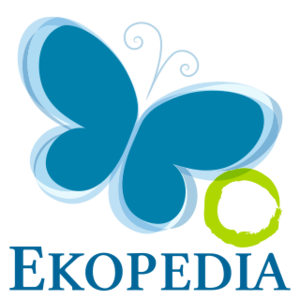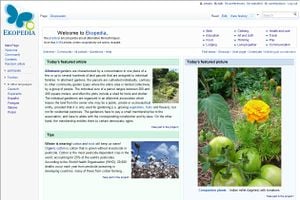

Ekopedia is a collaborative and multilingual wiki project dedicated to providing answers and spreading practical knowledge related to environmental sustainability. Their goal is to help everyone become more independent and establish the foundation necessary to build a better world. All content on Ekopedia is under a Creative Commons license.
History[edit | edit source]
Created in Quebec in December 2002 under the name of Newlimits.org, the project was initially in French and under Free Art License. It was using TWiki wiki application for collaborative edition and in 2004, community decided to migrate to MediaWiki.
The project got over 1000 articles December, 10 2006.[1] In 2008, Ekopedia had about 2500 articles (> 1 800 in French).
The Ekopedia Foundation was created in September 19, 2007[2]
In april 2009, Ekopedia has migrate all its contents from Free Art License to Creative Commons (CC-BY-SA-3.0)[3] in order to facilitate content sharing with other projects like Wikipedia, and Appropedia.
After Ekopedia went off-line around mid-2015, its french version is back online as of february 2017, with almost 2500 articles. Some info on Ekopedia's recovery can be found here.
Project details[edit | edit source]
Ekopedia gives people solutions and practical knowledge in order to act in a more environmentally sound way. Ekopedia is a wiki-based website (like Wikipedia) using MediaWiki. Ekopedia now licensed under Creative Commons CC-BY-SA-3.0 (after having been under Free Art Licence for more than 6 years).[4]
Ekopedia is developed mainly in French, Polish, and Italian. In 2008, French Project received 2,3 millions uniques visitors and each day, an average of 11,000 people come to visit and participate in the project, which makes Ekopedia the most visited[5]French website focused on ecology and sustainability issues.
Ekopedia articles are organized around 12 topics in order to meet the basics needs of people: Birth, Education, Food, Lodging, Clothing, Art and craft, Thinking, Living together, Health and care, Travel, Play and Communication. There are thus many articles on green building, washable diapers, seasonal vegetables, electric vehicles or even tofu manufacturing.
Ekopedia is different to Wikipedia as certain types of content and collaboration are not suitable for Wikipedia.[6] In contrast to Wikipedia, Ekopedia content requires a different approach in selecting and writing articles.
Since the end of 2008, Appropedia and Ekopedia Projects are in active collaboration that could lead to a projects merge.[7]
References[edit | edit source]
Press references[edit | edit source]
Here is a list of some press references:
- January 15, 2009: Article "Ekopedia: Une encyclopédie pour construire un monde meilleur" by Virginie Roy from Canoe.
- January 2 2009: Interview of Jean-Luc Henry at radio Première heure on Radio-Canada. Listen in mp3 or ogg
- April 2008: Reportage about Ekopedia on radio le Mouv des campus on Radio-France.
- April 10, 2008: Reportage about Ekopedia on radio Vous Etes Ici on RadioCanada. Listen in (mp3 or ogg)
- January 11, 2007: the newspaper Metro wrote Ekopedia, le Wikipedia écolo.
- December 2, 2006: Magazine Télérama n° 2968 published Critique Internet Ekopedia
- April 2006: the book Wikipédia, comprendre et participer wrote about Ekopedia.
- January 2006: magazine "Micro Hebdo" (01net) published "l'encyclo écolo http://www.01net.com/article/303333.html"
- December 2005: Liberation Newspaper published Ekopedia: L'encyclopédie des alternatives.
References[edit | edit source]
- ↑ Ekopedia dépasse les 1000 articles
- ↑ https://web.archive.org/web/20160108111027/http://www.fondationekopedia.org/Image:Lettres-patentes-fondation-ekopedia.png
- ↑ http://web.archive.org/web/20151106084733/http://en.ekopedia.org/Ekopedia:Licence-Migration-CC-BY-SA-3.0
- ↑ http://web.archive.org/web/20151106084733/http://en.ekopedia.org:80/Ekopedia:Copyright
- ↑ Bilan 2008 du projet Ekopedia.org
- ↑ Ekopedia is different from Wikipedia
- ↑ Ekopedia and Appropedia are adopting a deep but adaptable partnership: Appropedia:Memorandum of Understanding/Ekopedia.